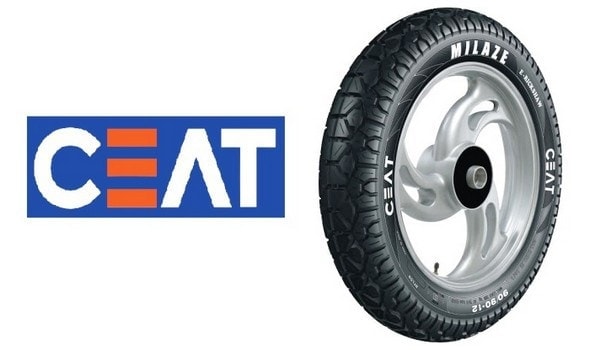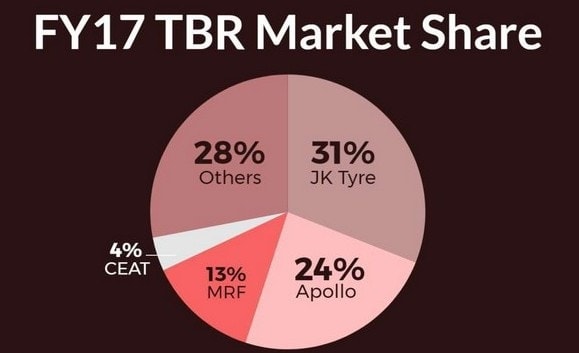Let’s explore CEAT Tyres’s SWOT analysis by understanding its strengths, weaknesses, opportunities, and threats.
Ceat Tyres Limited is a company started in Turin and based in Mumbai. It manufactures and sells automobile tires, tubes, and flaps. The Company is one of the top producers of radials for multiple kinds of vehicles. It manufactures tires for light commercial vehicles (LCVs), two-wheelers like motorcycles and scooters, passenger cars, farm vehicles, trailers, the road (OTR)/specialty vehicles, and trucks, among others.
With a production capacity of around 95,000 times daily, the Company has an annual turnover of nearly USD 1 billion.
Overview of CEAT Tyres:
- Industry: Tyres & Tubes
- Founded: 1924, 100 years ago, in Turin, Italy
- Founders: Virginio Bruni Tedeschi
- Headquarters: Worli, Mumbai, India
- Key people: Harsh Goenka (Chairman), Anant Goenka (Vice Chairman), Arnab Banerjee (MD & CEO)
- Revenue: ?11,963 crore (US$1.4 billion) (2024)
- Operating income: ?894 crore (US$110 million) (2024)
- Net income: ?635 crore (US$76 million) (2024)
- Total assets: ?9,994 crore (US$1.2 billion) (2024)
- Total equity: ?4,052 crore (US$490 million) (2024)
- Number of employees: ~8,000
- Parent: RPG Group
- Website: ceat.com
Table of Contents
Strengths of CEAT Tyres
1. Wide product portfolio
The CEAT brand is famous for its motorcycle tyres, which are sold under the labels CEAT Zoom, CEAT Zoom Tubeless, F67, F85, Milaze, Secura Sport Secura Zoom, etc. The Company manufactures scooter tyres under Gripp and Zoom D and passenger car tyres under Czar AT, Czar HT, Rhino, and Rhino TQ.
Their range of commercial vehicle tyres is Buland and Buland Mile XL RIB, while for three-wheelers, it is Anmol SL and Buland Mile XL. In addition, it also manufactures tyres for farm and agricultural vehicles and specialty tires for mining, quarrying, rock excavation, construction, and port applications.
2. High brand visibility
Ceat Tyres is a famous brand in India that has high brand recall and recognition. The company is consistent in its advertisements and has always communicated a value-driven and technologically savvy value proposition.
3. Focus on customer needs.
Ceat has always based its products on customer feedback and modified them according to customer perceptions. The company’Company’sfocus is on technologically superior products and driving safety.
4. FMCG model distribution channel
Unlike other tire manufacturers, the company has a distribution channel for FMCG companies. Instead of selling tyres directly to customers, they have added an intermediate layer of dealers who sell them to sub-dealers. This has helped them widen their reach considerably.
5. Advertisements
The company has been taking many promotions lately, and some of the latest campaigns, like the Nimbu Mirchi one, have grabbed the customer’s attention significantly.
Weaknesses of CEAT Tyres
1. No market leadership
Though Ceat has a presence in multiple categories, such as two equipment and specialty tyres, it is not a market leader in any of these categories, though it has a strong brand presence.
2. Low margins
Ceat’s key focus area is truck radial tyres. Competition in this domain is high, resulting in low sales volumes and high margins.
3. Focus on too many segments at a time.
The Company focuses on company segments at a time, which has diluted its presence in all segments. They could not beat the competition, which thinned down the already scarce resources.
4. Low focus on after-sales service
Though Ceat Tyres has many customer service outlets, the quality of service is poor. There are also many complaints about the personnel’s behavior in the service outlets.
Opportunities of CEAT Tyres
1. High growth potential
The country has around 60 manufacturers of tyres, both big and small, some of whom are regional players. The tyres market’s growth rate is around 9 % per year between 2015 and 2021. The highest growth is predicted for two-wheeler tyres.
2. Changing Customer Needs
Customer needs are changing continuously, and currently, the demand is for driving safety and comfort. This is creating a huge market for tyres with high grip.
3. Growing market for passenger cars
The passenger car market in India is growing, and many multinationals are setting up shop there. This will result in an increase in demand for OEMs.
Threats of CEAT Tyres
1. Competition
The company faces stiff competition in India from brands like JK Tyres, Apollo Tyres, Dunlop, Bridgestone, Michelin, Goodyear, and Cooper tyres.
2. High cost of material
Materials used in tyres, like synthetic rubber, carbon black, steel reinforcement, chemicals, etc, are highly fluctuating, and this will invariably affect the final pricing of the products,
Conclusion
In conclusion, CEAT Tyres has a diversified product portfolio and excellent brand exposure in India, supported by its customer-focused strategy and innovative product development. However, obstacles such as market supremacy in specific areas, low margins in truck radial tyres, and issues with after-sales service remain.
Despite this, CEAT Tyres is well-positioned to capitalize on prospects in India’s burgeoning tire market, driven by rising demand for safer and more comfortable driving experiences, notably in the two-wheeler and passenger car segments. CEAT Tyres must strengthen segment-specific initiatives while prioritizing service quality improvements to maintain its market position and generate future growth.
Liked this post? Check out the complete series on SWOT

